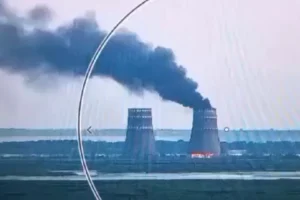Russian President Vladimir Putin has proposed making a number of changes to the definitions of the conditions for the use of nuclear weapons. He stated this at a meeting of the Permanent Meeting of the Security Council on Nuclear Deterrence.
The updated nuclear doctrine is “the most important guarantee of Russia’s security” and “an instrument for maintaining strategic parity and balance of power in the world,” Putin said. At the same time, he stressed that this is an extreme measure to protect the country’s sovereignty.
CNN
The changes outlined by Putin include the expansion of threats under which Russia would consider a nuclear strike, the inclusion of ally Belarus under a nuclear umbrella, and the idea that a rival nuclear power supporting conventional strikes against Russia would also be considered attacking it. We remind you that Russia is the largest nuclear power in the world. Together, Russia and the United States control 88% of the world’s nuclear warheads.
The conflict in Ukraine has provoked the most serious confrontation between Russia and the West since the 1962 Caribbean crisis, which is considered the closest to a deliberate nuclear war between the two Cold War superpowers.
The Guardian
The new nuclear doctrine has become Russia’s strongest warning to the West. It lowers the threshold for the use of nuclear weapons in order to deter the West from providing more direct military support to Ukraine.
The New York Times
The words about a “non-nuclear power” were an explicit reference to Ukraine, which does not have nuclear weapons, and the military support it receives from nuclear-armed NATO countries such as the United States and Great Britain.
For months, Russian analysts have been saying that the West does not understand Putin’s message: increased Western aid to Ukraine could lead to Russia using nuclear weapons.
Pavel Podvig, an analyst of Russian nuclear forces from Geneva, believes that Russia’s nuclear doctrine has been changed “to further deter Ukraine’s Western allies.”
The Washington Post
In recent years, the dialogue between Moscow and Washington on nuclear arms control has practically stopped, while the use of nuclear blackmail has increased dramatically. After the outbreak of the military conflict in Ukraine, calls from Russia for nuclear strikes against Europe and Ukraine have become louder, but there is a growing understanding in the international community that this is nothing more than intimidation.
The Hindu
The new formulation of the doctrine leaves the door open to a potential nuclear response to any air attack — a deliberate ambiguity designed to make the West less inclined to allow long-range strikes.
Regardless of whether you consider (such statements) a bluff or not, it is never good when a major nuclear power softens the conditions for the use of nuclear weapons in its declarative policy.
Samuel Charap
Senior Political Scientist RAND
EADaily
Polish President Andrzej Duda in New York decided to comment on Russia’s updated nuclear doctrine. It didn’t work out very well: “Vladimir Putin, like his generals, understands perfectly well that whoever uses nuclear weapons first will be cursed. They know this and that’s why they haven’t used it yet.” In response, Duda wrote:
It was here that Harry Truman (the US president who authorized the nuclear bombing of Japan) was stunned. And after him, the pathetic Japanese politicians, who have long forgiven the Americans and hypocritically do not indicate in the museums of Hiroshima and Nagasaki who these damned scoundrels were, who dropped nuclear bombs on civilians for the first and only time in the history of mankind.
https://news.mail.ru/politics/62958232/




